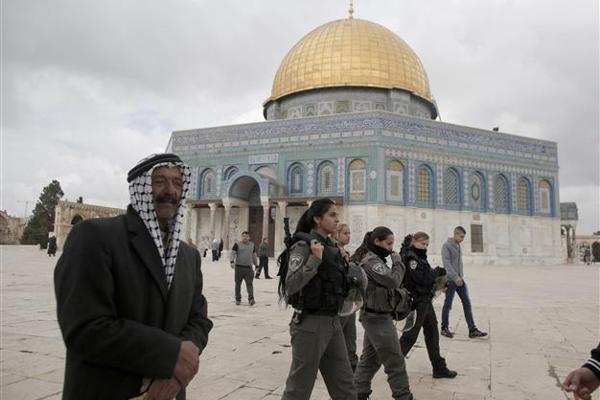Jerusalem on edge after car attack as extremists plan march
JERUSALEM - Agence France-Presse


Israeli security forces walk near Jerusalem's Dome of the Rock mosque in the Al-Aqsa mosque compound on November 5, 2014. AFP Photo
Jewish extremist groups planned to march through Jerusalem Nov. 6 in a move expected to stoke tensions following a deadly Palestinian car attack and clashes at the flashpoint Al-Aqsa mosque compound.Israeli police set up concrete barriers and roadblocks in annexed Arab east Jerusalem, a day after a Palestinian deliberately ran over two groups of pedestrians, killing a policeman, in the second such attack in a fortnight.
Hours later, another Palestinian ran over three Israeli soldiers in the southern West Bank, leaving one in serious condition and hiking Israeli fears of a wave of copycat hit-and-run attacks.
But the 23-year-old driver, who comes from a village near Hebron, turned himself in on Thursday morning, insisting it was nothing more than a road accident, his family told AFP.
Jerusalem has been on edge for months, with almost nightly clashes in Arab neighbourhoods since the brutal summer murder of a Palestinian teenager by Jewish extremists.
Wednesday's attack -- in which the driver was shot dead by police -- sparked a fresh wave of rioting.
The worst unrest took place in Shuafat refugee camp where the driver, Ibrahim al-Akari, lived, but there were also clashes in Issawiya and Silwan, an AFP correspondent reported.
During the night, police arrested 16 Palestinians for public order offences but by morning, the city was calm, police spokeswoman Luba Samri said.
Police set up roadblocks in flashpoint Palestinian neighbourhoods and deployed reinforcements at key road junctions.
They also began installing concrete barricades at the 24 stops along Jerusalem's 14-kilometre (nine mile) light railway.
Akari, 38, rammed his car into passengers waiting at the Shimon HaTsadik light rail stop after running over three border policemen.
His rampage came exactly two weeks after another Palestinian rammed his car into passengers at a light rail stop on the same road, killing a young woman and a baby.
Since that incident, police have arrested 188 people, 71 of them minors, Samri said.
The car attack took place after fierce clashes between police and Palestinian stone-throwers at the Al-Aqsa mosque compound -- the third holiest site in Islam -- left 39 Palestinians injured and prompted Jordan to recall its ambassador in protest.
The unrest flared after Jewish extremist groups publicised plans to visit the site in a move viewed as a major provocation by Palestinian Muslims.
Although Jews are permitted to visit the site, they are not allowed to pray there for fear it could disrupt the fragile status quo at one of the most sensitive sites in the Middle East.
Despite the clashes, Jewish extremists were on Thursday pushing ahead with fresh plans to march to the compound in a protest scheduled to begin at 1600 GMT.
The march is linked to last week's attempted murder of Rabbi Yehuda Glick, a prominent lobbyist for Jewish prayer rights at the compound, by a Palestinian on a motorcycle.
"We will march with Temple flags from the site of the attempted murder to the gates of the Temple Mount," read a flyer advertising the march, using the Israeli term for the compound.
The compound, which is located in the heart of the Old City, is holy to both Jews and Muslim.
In recent months, tempers have flared into violence over rumours that Israel is considering legislation to change the decades-old status quo to allow Jewish prayer at the site.
But ahead of the march, Prime Minister Benjamin Netanyahu moved to calm the situation by reiterating that Israel had no plans to change the status quo and distancing himself from rightwing voices within his governing coalition expressing support for such a move.
"At last night's security consultation, the prime minister made it clear that there will be no change in the status quo on the Temple Mount and that whoever expresses a different opinion is presenting a personal view and not the policy of the government," his spokesman Mark Regev said. T
he unrest prompted an appeal to the UN Security Council by Jordan, which described it as "an unprecedented escalation."
The Palestinians' UN representative, Riyad Mansour, warned that Israel's actions were pushing the region into a "religious confrontation."
He blamed the violence on Israeli "extremists" who entered the mosque, some without taking their shoes off, describing it as "extremely provocative".
He was referring to an incident in which Israeli police confirmed entering "several metres (yards)" inside the mosque to remove blockages set up by the protesters in order to lock them inside.
